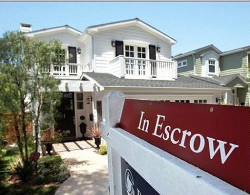


We will facilitate the sale or purchase of your home.
FAQ's
What happens in Escrow?
An escrow is an arrangement in which a disinterested third party, called an escrow holder, holds legal documents and funds on behalf of a buyer and seller, and distributes them according to the buyer's and seller's instructions.
People buying and selling real estate often open an escrow for their protection and convenience. The buyer can instruct the escrow holder to disburse the purchase price only upon the satisfaction of certain prerequisites and conditions. The seller can instruct the escrow holder to retain possession of the deed to the buyer until the seller's requirements, including receipt of the purchase price, are met. Both rely on the escrow holder to carry out faithfully their mutually consistent instructions relating to the transaction and to advise them if any of their instructions are not mutually consistent or cannot be carried out.
An escrow is convenient for the buyer and seller because both can move forward separately but simultaneously in providing inspections, reports, loan commitments and funds, deeds and many other items, using the escrow holder as the central depositing point. If the instructions from all parties to an escrow are clearly drafted, fully detailed and mutually consistent, the escrow holder can take many actions on their behalf without further consultation. This saves time and facilitates the closing of the transaction.
The escrow process was developed to help facilitate the sale or purchase of your home. The escrow holder accomplishes this by:
* Acting as the impartial "stake-holder," or depository of documents and funds
* Processing and coordinating the flow of documents and funds
* Keeping all parties informed of progress on the escrow
* Responding to the lender's requirements
* Securing a title insurance policy
* Obtaining approvals of reports and documents from the parties as required
* Prorating and adjusting insurance, taxes, rents, etc.
* Recording the deed and loan documents
* Maintaining security and accountability of monies owed and owing
What does each party do in Escrow?
The Seller:
* Executes all escrow instructions.
* Deposits the executed deed to the buyer with escrow holder.
* Deposits or causes to be deposited other documents as required by the Purchase Agreement or the escrow instructions. This may include, but not necessarily limited to, all documents to transfer and/or clear title to the buyer, evidence of termite inspection with the Notice of Completion, home warranty contract, city requirements (if any) and Federal and/or State requirements.
The Buyer:
* Executes all escrow instructions.
* Approves any inspection reports, preliminary report of title, etc. as called for in the Purchase Agreement or escrow instructions.
* Executes any Deed of Trust necessary to secure the loan(s) on the property.
* Deposits funds for the down payment, plus funds required to pay costs and causes any borrowed money to be deposited with escrow holder to complete the purchase price.
The Lender (if applicable):
* Approves buyer and prepares loan documents for execution by the buyer.
* Deposits proceeds of the loan to the purchaser.
* Directs the escrow holder on the conditions under which the loan funds may be used.
The Escrow Holder:
* Receives a copy of the Purchase Agreement from the real estate agent or takes the contract verbally from the parties.
* Prepares escrow instructions, deeds and any other documentation required based on the agreement between the two parties.
* Opens the order for title insurance.
* Obtains demands on existing liens of record.
* Obtains buyer’s approval on the preliminary report of title and termite completion as called for in the Purchase Agreement and escrow instructions.
* Obtains approval from the respective party on any disbursements made through escrow such as payoffs to the existing lenders, termite inspections/completion, home warranty and any other invoices presented to escrow holder.
* Receives executed escrow instructions from all parties.
* Prepares Estimated Settlement Statement for the respective parties which shall specify amounts for escrow services, title insurance fees, real estate commissions, payoff of existing deeds of trusts, lien clearances, termite report, home warranty and any other items required to clear title and in accordance with the Purchase Agreement and escrow instructions.
* Prorates insurance, taxes, rents, etc.
* Receives funds from the buyer and/or lender.
* Receives the deed (and money, if applicable) from the seller.
* Disburses funds for title insurance, recording fees, real estate commissions, lien clearance, etc.
* Records deed and loan documents, delivers the deed to the buyer, loan documents to the lender and funds to the seller, closing the escrow.
* Prepares a final statement for each party, indicating amounts to be disbursed for services and any further amounts necessary to close escrow.
Closing the Escrow:
Once all the terms and conditions of the instructions of both parties have been fulfilled, and all closing conditions satisfied, the escrow is closed and the safe and accurate transfer of property and money has been accomplished.
The method of dividing the charges for the services performed through escrow or as a result of escrow varies from place to place. The fees and service charges to be divided might include, for example, the title insurance policy premium, escrow fee, any transfer taxes, recordation fees and cost in connection with any loan being obtained. Unless there is some special agreement between the buyer and seller as to how these charges are to be paid, local custom will generally be followed in drafting the instructions to the escrow holder as to how they are to be divided.
Home | About Us | FAQ'S | Contact Us


Call Us 818-342-2629